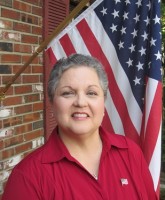Election 2013: Harckham Bids for Re-election Against Lewisboro GOP Chair

The race for the Westchester County Board of Legislators’ District 2 seat pits three-term Democratic incumbent Peter Harckham against first-time candidate Andrea Rendo. Harckham also appears on the Independence and Working Families lines while Rendo is running with Republican and Conservative backing.
 Rendo, 46, an attorney who practices in Mount Kisco, is chair of the Lewisboro Republican Town Committee. She entered the race, in part, because she felt District 2 residents weren’t being adequately represented.
Rendo, 46, an attorney who practices in Mount Kisco, is chair of the Lewisboro Republican Town Committee. She entered the race, in part, because she felt District 2 residents weren’t being adequately represented.
Budget Issues
Harckham said during the last three years spending was reduced $100 million, the county workforce was slashed by 15 percent and property taxes were cut 2.2 percent. In addition, the county has maintained a AAA bond rating and has a fund balance equal to 10 percent of the current year’s budget.
Five of the county’s eight employee unions are now paying a portion of their health insurance. Harckham supported legislation requiring elected county officials and senior nonunion management to pay part of their health insurance.
Rendo said he agreed with County Executive Rob Astorino’s insistence on not raising county property taxes.
“It’s very important to make sure that we get the most use out of every single tax dollar before we start saying we have to raise taxes or we need to go into our emergency fund,” she said. “I want to continue doing what Rob Astorino’s been doing–looking at everywhere we can possibly be find an alternative.”
Those alternatives could include public-private partnerships, she said.
Rendo criticized the Democratic legislators who walked out on the budget vote.
“They didn’t stay behind and do their job,” she said.
Harckham defended the move.
Most of the Democrats were willing to negotiate with Republicans, but the GOP members “used a rules technicality to force through this budget,” Harckham said. It also was passed without public input or analysis by staff.
Harckham opposed the provision in the budget that called for borrowing to pay tax certioraris and criticized cuts in county funding for neighborhood health centers, including Open Door Family Medical Center. He said $3 million in county and state matching money for the centers was cut.
Affordable Housing
Harckham said the county is “ahead of schedule” to build 750 new affordable housing units as mandated in its settlement with the Department of Housing and Urban Development (HUD). The county must meet with HUD to work out the Analysis of Impediments for the seven communities found by the monitor to have exclusionary zoning.
The Astorino administration cost Westchester $7.4 million in federal block grant funding, Harckham said, adding that the county could be liable for $500 million in fines and penalties if it does not comply with the settlement. There needs to be housing for seniors, first responders, municipal employees and recent college grads.
“We have a grave need for affordable housing in this county,” said Harckham.
Rendo said she would have opposed the settlement because it doesn’t take into account environmental constraints.
“Peter was one of the crucial votes in getting that settlement passed,” she said. “When you look at the details and the contents of the settlement I don’t think it properly addresses the issues that exist in northern Westchester.”
The settlement fails to give priority for housing to those already living in Westchester, Rendo said.
Child Care
Harckham said he opposed the county’s requirement to mandate that families who receive assistance for day care costs pay a greater share. When Astorino took office in 2010, the parent share was 10 percent, but today parents must pay 27 percent, Harckham said. Astorino’s policies have also led to a potential loss of $7 million in federal and state aid for child care, Harckham said.
Rendo said she was happy the compromise budget lowered the parent share, allowing additional families to participate.
“I think 35 percent was harsh,” she said. “That was doubling it in a short period of time.”
Environmental Issues
Harckham said he has been endorsed by the New York State League of Conservation Voters, mainly for his work to protect the watershed. He has worked with the state Department of Environmental Conservation to develop a septic management ordinance which has saved municipalities and homeowners hundreds of thousands of dollars.
Rendo said Westchester should promote green technology.
“I think the county has an obligation to look at every time a new project is taken on…it cannot be cost-prohibitive.” — Neal Rentz
Kaplowitz Seeks Ninth Term in Rematch of ’09 Race
By Neal Rentz

Veteran county legislator Michael Kaplowitz is facing fellow Somers resident Gregory Kane in a rematch of the 2009 race in the Board of Legislators’ District 4. The district includes New Castle and portions of Yorktown and Somers.
Kaplowitz, 54, an attorney and certified financial planner and investment adviser, is on the Democratic and Independence party lines. Kane, 56, a retired Wall Street trader, will challenge on the Republican line. In 2009, Kaplowitz defeated Kane by 12 points.
Budget issues
Kaplowitz received much publicity–and some flak from his own party last year–when he was one of two Democrats to join with Republicans to pass the $1.7 billion 2013 budget. He defended his decision as being fiscally sound.
“I have actually lost a couple of friends over it,” he said.
Kaplowitz said he agreed with County Executive Rob Astorino against raising taxes and taking money from reserves to balance the budget. It was the correct decision to borrow $10 million, if necessary, to pay tax certiorari refunds, he said. If the $10 million had been taken from fund balance the county’s AAA bond rating would have been lost. The county hasn’t needed to borrow to pay tax refunds so far this year because of savings, he said.
Kane said county government has grown too large and Kaplowitz hasn’t done enough to limit spending.
“In 15 years he voted all along to expand government,” Kane said. “And one time he voted to rein it in and they gave him a ticker tape parade.”
The average annual property tax increase over Kaplowitz’s legislative career is 2.75 percent. He added that he opposed the 2004 budget, which included an 18.8 percent tax increase, and the 2010 budget, which saw a 2.9 percent hike.
Economic development
Establishment of a Local Development Corporation (LDC), which provides access to low-cost financing to nonprofit institutions, is a key accomplishment, Kaplowitz said. An LDC allows nonprofits to raise tax-free capital, which is funded by bonds. Northern Westchester Hospital, SUNY Purchase and White Plains Hospital are among the institutions that have been assisted, Kaplowitz said.
About a year was spent negotiating its creation with Astorino and the Board of Legislators.
“It really sums up the role that I play as a legislator,” he said, adding he “brings parties together.”
Kane said lower taxes will encourage more businesses to come to Westchester. The county needs to promote itself to attract new businesses and individuals to visit, he added.
Affordable Housing
Kaplowitz said he has taken a practical approach in dealing with the county’s affordable housing settlement with the Department of Housing and Urban Development (HUD). The settlement, which Kaplowitz supported, called for Westchester to set aside $51.6 million to construct 750 affordable units. Failure to accept the settlement could have cost the county $180 million, he insisted.
The county is on its way to building the 750 units. However, it still needs to comply with an Analysis of Impediments, Kaplowitz said. Once officials in the seven communities found to have exclusionary zoning make revisions to their codes and the 750 units are built, the settlement will have been satisfied. Then the county can work with developers to construct additional affordable units, he said.
Kane said he would have voted to reject the settlement and added that county officials who misused HUD funds “should be held accountable.”
In some areas, zoning doesn’t allow for affordable housing.
“There’s no discrimination here,” he said.
“The whole (real estate) market right now needs to find its own bottom,” said Kane who added that affordable housing would undermine the housing market.
Day Care
The current year’s county budget has a provision that has raised the contribution for parents eligible for child care assistance to 27 percent. When he first took office those parents paid 35 percent, but it was eventually reduced to 15 percent during former County Executive Andrew Spano’s administration.
The county needs to afford the subsidies it provides to day care facilities, Kaplowitz said. Many entities, including New York City, require a 35 percent parental contribution to day care, he said.
Kane acknowledged that some families need assistance. He did not have a position on what percentage a family should pay toward child care.
Other Issues
Kaplowitz pointed to his accomplishments for his work on sewers. For example, one of his achievements has been to expand the county sewer district into three areas of New Castle, which took 15 years.
Kane said the county should fight to end the MTA payroll tax and should assess “the real value” of the New York City watershed property in Westchester to obtain additional property taxes from the city.
Maybury Looks to Fend Off Independent Challenger in Mt. Pleasant
By Neal Rentz

Mount Pleasant Supervisor Joan Maybury is being challenged for re-election by Anthony D’Aria, who is running on the independent We the People line.
The campaign took a strange twist last week when D’Aria was arrested and charged with forgery for allegedly attesting to five forged signatures on a petition carried for his running mate’s campaign manager.
Maybury, 58, was appointed supervisor in January 2010, replacing longtime supervisor Robert Meehan, who left to become county attorney under County Executive Rob Astorino. Maybury was originally elected to the town board in 1991.
After a tough economy and major storms, Maybury said she was hopeful of a “turnaround.”

D’Aria, 46, the CEO of a Briarcliff Manor investment firm, is making his first run for public office. He has been active in the community, including being a Mount Pleasant Fire Department volunteer for a decade and a member of the Mount Pleasant Lions Club for five years. However, D’Aria said community service should not be a requirement. Instead, business experience is more appropriate for a town supervisor.
The Valhalla High School graduate said he sought to run as a Republican but his petitions were successfully challenged and he was knocked off the September primary ballot.
Budget Issues
The main focus of D’Aria’s campaign has been town finances. A report from the state comptroller’s office earlier this year found Mount Pleasant to be “susceptible to fiscal stress” ranking it near the bottom in the state, in part because of low fund balance.
D’Aria is also concerned about the town’s debt. The comptroller has pointed to Mount Pleasant’s revenue anticipation notes, which are “short term financing tools to meet revenue shortfalls,” he said. In 2010 the notes totaled $5 million, then $5.4 million in 2011 and $8.4 million in 2012. That translates into a $3 million budget shortfall with money being borrowed to bridge the gap.
“We don’t have good quality people watching the cash register,” D’Aria said.
Tax certioraris being paid to businesses and homeowners that have successfully challenged the assessments of their properties along with state mandates, including soaring employee pension costs, are also negatives for the town, he said.
Municipal bond debt of $58 million for Mount Pleasant also contributed to the downgrading of its bond rating last January by Moody’s. The downgrade will increase the cost of borrowing for the town, he said.
Town spending rose from $42.9 million in 2009 to $48 million this year, D’Aria said. Virtually all Westchester towns are facing the same economic climate and unfunded mandates as Mount Pleasant, but they are in better financial shape, D’Aria said.
“The state comptroller’s office is basically telling us your town is failing,” he said.
One way to cut spending in town is to hire permanent part-time employees to replace full-time workers, D’Aria said.
Maybury, who resides in Hawthorne, said the comptroller’s report was incomplete because many communities haven’t been evaluated yet.
However, she explained that only one part of the three-part town budget, was susceptible to fiscal stress. The A Budget, which takes in Town Hall staff, was what the comptroller’s office referenced. Mount Pleasant’s B Budget, which includes the police department, and the highway budget were not subject to stress, according to the comptroller’s office. The A Budget is “very dependent” on the mortgage tax and interest income, which have been significantly declining in recent years, she said.
Maybury said some of the fund balance was used to balance the A budget.
“We did that deliberately,” aside from spending cuts, she said.
Another factor that impacted the A Budget in 2010 and 2011 was the large number of people not paying their taxes, Maybury said.
There is currently over $1 million in A Budget fund balance and more than $1 million in B Budget fund balance and $500,000 in the highway budget.
“We are back where we need to be,” Maybury said.
Mortgage tax revenues have been higher than originally expected for 2013 and the additional revenues have been placed in fund balance.
Over the past few years, there have been employee layoffs to cut spending, Maybury said.
Though the 2013 budget exceeded the tax cap, Maybury said she planned to release a
a 2014 budget this week that would come in under next year’s 1.66 percent tax cap.
Shared Services
D’Aria and Maybury agreed for the need for additional sharing of town services. The challenger said the town should once again explore merging its police department with Pleasantville. The town could also look into sharing police services with the county or state police, he said. The town should also look at sharing some services with local school districts, D’Aria added.
Maybury said the town already shares services with other municipalities and would look for additional opportunities to do so.
Economic Development
Maybury touted several developments proposed and under consideration as examples of strong economic development. Projects such as the North 60 medical village proposal in Valhalla, that would include a science museum for students to promote healthy living, and the proposal from EF International Academy to transform the Legion of Christ property in Thornwood to turn it into a boarding school are three of the largest projects.
A developer wanted to construct 150 housing units near Westchester Medical Center, but the town would not allow it, D’Aria said. If the developer was allowed to construct one-bedroom apartments, there would have been little impact on local school districts, he said.
“The building department is your future cash registers. It must be managed closely,” D’Aria said. “That’s the most important cash register for the town.”
Affordable Housing
Maybury said Mount Pleasant is not required to construct affordable housing under the county’s 2009 settlement agreement with the Department of Housing and Urban Development (HUD) because the town opted against accepting federal block grants.
The town already provides developers with opportunities to construct affordable housing under its current zoning, Maybury said.
“Local governments should have control over their zoning,” she said.
Other Issues
In response to major storms in recent years, the town has taken several steps to improve communications with the public in emergencies including e-mail blasts, a Facebook page and a phone calling system, Maybury said.
“We really are the first line of defense,” she said.
Maybury said she meets with the police and fire departments and volunteer ambulance corps personnel quarterly to devise ways to better respond to emergencies.
“It continues to be a work in progress,” she said.
Despite her breadth of knowledge with more than 20 years experience as a councilwoman and supervisor, Maybury is “a lifelong bureaucrat,” D’Aria charged.
“If elected, I will try to spend the taxpayers’ money like it’s my own,” D’Aria said. “I’m beholden to no one.”
Mt. Pleasant Town Board GOP Candidates Challenged on Finances
By Neal Rentz
The Mount Pleasant Town Board will have a new look next year. Longtime incumbents Peter DeMilio is retiring while Thomas Sialiano failed to receive the town’s Republican Committee’s endorsement and has opted against running an active campaign. He remains on the Independence Party line.
Republicans Denis McCarthy of Hawthorne and Laurie Rogers-Smalley of Valhalla are being challenged by John Casario, who appears on the independent We the People line with supervisor candidate Anthony D’Aria.
John Casario
 Casario, a corporate accountant for about 25 years, said his taxes and finances was his impetus to run. For nearly 30 years no one on the town board has had a financial background, he said.
Casario, a corporate accountant for about 25 years, said his taxes and finances was his impetus to run. For nearly 30 years no one on the town board has had a financial background, he said.
“That seems odd to me,” Casario said. “I think that needs to change.”
A state comptroller’s report released in May highlights fiscal problems, he said. The report, which evaluated the past three years, stated that Mount Pleasant has maintained a low fund balance, which Casario called “dangerous.”
“What they’re doing is raiding the fund balance to cover current operating expenses instead of taking a look at the overall budget,” Casario said.
The town also has an operating deficit because expenses exceed revenues, he said.
The current board’s budgeting practices resulted in Moody’s downgrading Mount Pleasant’s bond rating from Aa1 to Aa2 in January with a negative outlook. As a result, the cost of borrowing will rise, he said.
“Borrowing money leads to tax increases and it leads to property values going down,” Casario said. “The first step of a recovery program is recognizing that you have a problem in the first place.”
Casario said if elected, he would bring together residents with financial expertise to devise a financial plan to include cost-cutting measures, sharing of services and the exploration of federal funds. One area to share services is to have communities plagued by Saw Mill River Parkway flooding work to find regional solutions, he said.
The challenger also heavily criticized the town Republican Party, which he charges with preventing new people from running and becoming district leaders. Initially, Casario said he wanted to become a district leader but the local GOP knocked him off the primary ballot on a technicality, one of 26 individuals to be denied the ability to run.
Casario said he wants to encourage economic development, but would first speak to residents and current business owners to find out what they would want to come to town.
A visit to other boarding schools would be necessary before forming an opinion on the EF International Academy proposal to renovate the Legion of Christ property. There might be better uses than a boarding school, he said.
Casario declined to comment on projects before the planning board.
Denis McCarthy
 This isn’t the first time McCarthy, 44, has run for public office. In 1996, the engineer and property manager, was defeated in the 17th Congressional District race by Democrat Eliot Engle.
This isn’t the first time McCarthy, 44, has run for public office. In 1996, the engineer and property manager, was defeated in the 17th Congressional District race by Democrat Eliot Engle.
McCarthy, a three-and-a-half-year planning board member, said he’s always been involved in public service and active on local issues.
He criticized the Department of Housing and Urban Development (HUD) for what he called the agency’s efforts to dismantle local zoning and short-circuit the environmental review process, which would impact the watershed and schools. Even though the town is exempt from the housing settlement because it did not accept federal funds, McCarthy said he supports County Executive Rob Astorino criticisms of HUD.
“To want to dismantle (local zoning) is to dismantle a community,” he said.
However, McCarthy said affordable housing is needed in the area, especially for young adults, town employee and seniors.
“It would be great to have something for downsizing for our elderly population and also for our children,” he said. “It won’t be the federal government telling us how to do it.”
McCarthy said he did not see the financial stress on the town that the two independent candidates have claimed, saying that Supervisor Joan Maybury and the current board have done “a great job.”
The Pace University consolidation project to move its operations to the Pleasantville campus the planning board this summer, is “great for the community.”
McCarthy said he was influential in reestablishing Pace’s Community Advisory Board through which residents can express their views on issues of concern. He has also been active with similar committees for Hawthorne Cedar Knolls and Pleasantville Cottage schools.
McCarthy said he would like the Legion of Christ property returned to the tax rolls, but declined to comment on the boarding school plan since he still sits on the planning board.
He and Rogers-Smalley support the push to attract biomedical companies.
“It’s visionary. It’s going to help our schools,” McCarthy said. “It’s going to help jobs. It’s going to help our communities.”
The two Republican council candidates also want to upgrade the appearance of the town’s commercial areas because certain areas “look too industrialized,” he said.
The town should explore sharing more services with Pleasantville and promote sustainable energy technology with its local fire departments and schools to cut costs.
Laurie Rogers-Smalley
 Rogers-Smalley, 57, is in her first race for public office, although she has served as a Republican district leader for more than 25 years. She is a Westchester County Health Department supervising public health nurse.
Rogers-Smalley, 57, is in her first race for public office, although she has served as a Republican district leader for more than 25 years. She is a Westchester County Health Department supervising public health nurse.
Rogers-Smalley said she chose to run “to serve on a higher level.”
“I have a lot invested in Mount Pleasant,” said Rogers-Smalley, who has served as a Girl Scout leader, hosted exchange students and fundraised for Valhalla High School.
In the 1990s the town leased its swimming pool from the Rockefeller Foundation. Rogers-Smalley was part of a group that was influential in creating a town-owned pool.
“One of the very unique things I’ve been able to do is maintain a pulse of the community by staying active,” she said.
Keeping taxes in check and issues surrounding the HUD agreement are two immediate challenges, said Rogers-Smalley, who added that the town is diverse and cohesive.
“The residents of Mount Pleasant want to maintain their home rule,” she said. “We take pride in our local government. And we realize that is the core of our freedom here. We have the right to make decisions about our local zoning.”
Despite her opposition to some of HUD’s tactics, Rogers-Smalley said more affordable housing is needed. College graduates and young families are finding it increasingly difficult to settle in the area.
Rogers-Smalley said she supported Pace University’s campus consolidation, although the town should be concerned about the need for more police and emergency services despite an increase in on-campus security.
The EF International Academy proposal to bring a boarding school with about 800 students and 100 staff members to the Legion of Christ property worries Rogers-Smalley.
“I am concerned about infrastructure. I am concerned about supporting another high school,” she said.
While she backs bringing biomedical companies to town, those applications need to be carefully reviewed to limit negative impacts.
Rogers-Smalley also mentioned that more sharing of services should be explored with Pleasantville, including looking at the police department and recreation programs.
Despite criticisms from Casario on finances, Rogers-Smalley praised the current board’s fiduciary record.
“They have kept a tight rein on the finances in the last five to six years,” she said.
Chappaqua Crossing, Transparency Top Issues in New Castle Super’s Race
By Martin Wilbur
Next week’s race to determine who fills the Town of New Castle supervisor’s seat is filled with political intrigue.

Democrat Penny Paderewski , a 27-year town employee, has risen from director of finance to comptroller to deputy town administrator. For the past three years she has served as town administrator following the retirement of Jerry Faiella. For Paderewski, a nearly 30-year town resident, it is her first run for public office.

On the Republican side is Rob Greenstein, a lawyer who happens to be a registered Democrat. He selected his own slate of Lisa Katz and Adam Brodsky, a Democrat and independent, respectively, and called themselves Team New Castle. They received GOP backing after being outspoken critics of the affordable housing and Chappaqua Crossing plans.
Combine the political jockeying with the controversial proposed rezoning that would allow retail for a portion of Chappaqua Crossing, the former Reader’s Digest property, and some expect one of the largest voter turnouts for a town election in years.
“I really would like to be able to work with my fellow board members and be able to make some of those decisions,” Paderewski, 61, said of running for office. “I know how they’re made. I’ve been watching how they’ve been made for years and years and now I’d like an opportunity to do that.”
Regardless of the outcome, the town will need a new administrator, she said. Paderewski will either move from the administrator’s chair to the supervisor’s office or retire.
When Greenstein, 46, ran for town board in 2011, he did so on the independent Transparency in Government line. For the past two years, Greenstein has continued to do battle with the current administration during public meetings unafraid to aggressively quiz officials on information and openness. That’s one of the reasons why he, Katz and Brodsky scheduled a recently completed series of four meetings addressing key topics in town.
“We can’t just talk about transparency. If we’re going to talk about it, you have to be transparent,” said Greenstein who co-founded the Chappaqua-Millwood Chamber of Commerce. “Everything we’re doing, with these community meetings, we want to get people involved.”
Toward that end, Greenstein wouldn’t necessarily replace the town administrator. Instead, he would support hiring two people and spend the same $160,000–a communications director to help keep the residents informed and another position that’s more than a secretary but not a full-fledged administrator.
“I don’t think it’s the best approach for the town administrator to become supervisor,” he said. “I think it’s better to get somebody that has some vision and somebody who has a record of getting things done and I’ve been able to rally the troops.”
Paderewski said she would hold informal sessions with residents before regularly scheduled meetings and coffees throughout town to improve outreach to residents.
Chappaqua Crossing
The differences between the two candidates couldn’t be more stark than on their views regarding Chappaqua Crossing. Paderewski supports the current proposal that would make a grocery store the anchor for 120,000 square feet of retail while Greenstein has argued that the plan creates a third hamlet that would devastate local merchants.
The impetus behind a supermarket at Chappaqua Crossing followed public outcry when D’Agostino’s, the hamlet’s only grocery, moved out of its space on King Street near Route 117 two years ago. It would also help the commercial tax base.
“I think we need a grocery store over there,” Paderewski said. “I feel that I have a vested interest in what kind of grocery store…a high-end specialty store is what I’m looking for. I think it will do a lot of things for people. I don’t think it will kill the downtown. I really don’t think that.”
Paderewski said the retail shops, most of which would be at least 5,000 square feet, wouldn’t compete much, if at all, with merchants in the existing hamlets. Also, neighboring residents who are concerned over traffic also don’t recall the days when more than 5,000 employees streamed into Readers’ Digest daily, she said.
Meanwhile, Greenstein acknowledged that he initially suggested that a specialty grocery at Chappaqua Crossing could be beneficial, such as a Whole Foods, but that the community would be better served if it was downtown. He also said he never supported a shopping center at the campus.
With Walgreen’s now having moved into the old D’Agostino’s space, Greenstein predicted that the Rite Aid on North Greeley Avenue may eventually go out of business, a good location for a supermarket.
He said residents were never consulted about the retail proposal before town officials worked with developer Summit/Greenfield.
“If the residents say yes, then great, let’s talk about the type of retail you want but first ask the residents,” Greenstein said. “I personally think, speaking to residents, is that they’d rather see the downtown built up, but I think they’d rather see other uses (at Chappaqua Crossing).”
He is also adamant about the town completing its Master Plan update before moving ahead with Chappaqua Crossing development.
Downtown/Parking
Paderewski said downtown Chappaqua could use some infrastructure and aesthetic improvements. However, even with its current shortcomings, it is more in keeping with a countrified upper Westchester community rather than a busier and more populated down county town. It will also be helped after the town completes much-needed infrastructure work next year.
“I personally feel that our downtown is a beautiful downtown,” Paderewski said. “I love this downtown. I grew up in lower Westchester and we used to come up here to the country.”
She said there are certain appealing aspects to a plan floated by local resident and architect Chuck Napoli to add shops, apartments, parking and a performing arts center to make the downtown a thriving hub but fears it could cause too much congestion.
Greenstein said he would look into having a developer such as Summit/Greenfield swap the town hall property with a portion of Chappaqua Crossing. He also supports a parking structure at the train station which would contain parking instead of having a seven-acre field. Part of the space that would no longer be used for parking could also be developed.
“If you’re going to build over there (at Chappaqua Crossing) you have to shore up this downtown to make sure it doesn’t collapse,” he said. “You can’t say we’ll put up some signs and hope for the best. That’s not acceptable.”
Incumbent, Newcomers, Returnee Spice Up New Castle Board Race
By Martin Wilbur
An incumbent, two newcomers and a candidate who hopes to reclaim his seat comprise the lineup for next week’s New Castle Town Board elections.
The incumbent is Democrat John Buckley, who has served for the past 10 years. Also on the Democratic ticket is Michael Wolfensohn, who was on the board from 2007 to 2011, but was left off the ticket two years ago in favor of sitting Councilman Jason Chapin. Both Democrats are also on the Working Families line.
They are opposed by the two newcomers in the race who are part of the Republican Party’s Team New Castle, Adam Brodsky and Lisa Katz. Katz is a registered Democrat while Brodsky is an independent. The slate also appears on the Independence Party line.
Adam Brodsky
 Brodsky, 40, a real estate attorney, was recruited by Team New Castle’s supervisor candidate Rob Greenstein to run for town board once Greenstein was given the go-ahead by the Republican Committee to pick his own slate. Originally, Brodsky said he wanted to fill the current vacancy on the town’s planning board but never received a response from the town.
Brodsky, 40, a real estate attorney, was recruited by Team New Castle’s supervisor candidate Rob Greenstein to run for town board once Greenstein was given the go-ahead by the Republican Committee to pick his own slate. Originally, Brodsky said he wanted to fill the current vacancy on the town’s planning board but never received a response from the town.
Similar to his running mates, the debate over Chappaqua Crossing and the recently approved Conifer Realty affordable housing project were two of the key issues to spur Brodsky’s candidacy. The Chappaqua Crossing retail issue has demonstrated a lack of leadership among the current board, which appears to be appeasing developer Summit/Greenfield, he said.
“When Summit/Greenfield acquired the property, they paid a tremendous price for that property,” Brodsky said. “Now that the real estate market has changed, I think the property is worth a fraction of what it was worth when they acquired it. (That’s) not really the town’s concern.”
He said the high vacancy rate at the old Reader’s Digest site is at least as much the developer’s doing as it is market driven. If the company set the rental price low enough, then they could get some takers, Brodsky said. Most project opponents would welcome
A rezone would make for a fundamental change, not only at the site but throughout the town. Brodsky said officials should explore more residential.
If the Chappaqua Crossing property was to be rezoned, that would likely have a negative effect downtown, which Brodsky said is undervalued by the current town government.
“I think it’s important to develop an anchor for downtown Chappaqua to draw people here,” Brodsky said. “By having an anchor it would do more to diversify the downtown retailers. It would bring people into our community to shop.”
He agreed with Greenstein that the town could function without a town administrator if there was a communications director to keep residents in the loop along with another administrative position. Greater use of social media should also be introduced.
John Buckley
 Buckley, 56, a real estate broker in town, said he has enjoyed his time on the board and wants to continue serving his constituents and municipal employees.
Buckley, 56, a real estate broker in town, said he has enjoyed his time on the board and wants to continue serving his constituents and municipal employees.
“When people come to the podium and want to give commentary I feel privileged to be there to have them give me (their) concerns and it’s because I respect them,” Buckley said.
Unlike his running mates, Buckley does not support a zoning change at Chappaqua Crossing at this time because it wouldn’t be in the town’s best interests. His two objections are that he’s not satisfied with the traffic mitigation that has been proposed and the Master Plan does not call for a third shopping district with the fear that it could have a negative impact on the downtown.
An intelligent and logical Master Plan update should be undertaken first to improve quality of life, Buckley said. As it stands now, another 120,000 square feet of retail would hurt merchants in Chappaqua and Millwood.
“It will have a detrimental impact on the businesses that operate in both hamlets,” Buckley said.
Updating the Master Plan would also provide insight into improving the downtown by being able to incorporate an educational or cultural facility that is currently missing.
“We don’t have that,” Buckley said. “That’s what I’m looking for in the downtown. I think the benefit to that would be to all the businesses in town.”
During certain days and hours there is a premium on parking in downtown Chappaqua but Buckley believes it is more a function of space allocation than the number of spaces.
Another issue where Buckley was in the minority among the current all-Democratic board was the Conifer affordable housing project. He opposed the project primarily over safety concerns but is open to finding better locations in town.
After 10 years, Buckley’s enthusiasm for the job hasn’t waned. Despite the challenges surrounding a couple of controversial issues, New Castle is in strong position.
“I think we’ve really come to a good point and now it’s time to plan for the future with the Master Plan and take it into consideration,” he said.
Lisa Katz
 Katz, 43, who rounds out the trio of attorneys on this year’s Republican slate, said she briefly had reservations about running as a Republican but quickly realized that she has met likeminded people who shared many of the same concerns she held on the town.
Katz, 43, who rounds out the trio of attorneys on this year’s Republican slate, said she briefly had reservations about running as a Republican but quickly realized that she has met likeminded people who shared many of the same concerns she held on the town.
“I’m not in a back room with 10 other people figuring out how we’re going to vote on everything,” Katz said. “I’m going to vote the way I think is right and the way the town wants me to vote.”
While Chappaqua Crossing has been a focus of the candidates’ attention, Katz said she was also appalled by the town’s poor response to Superstorm Sandy.
Katz said that there are better uses for the former Reader’s Digest property, however, if the rezoning is completed before the Master Plan, the property would not be fully analyzed. One potential miscalculation has been the tax benefits of an additional $1.5 million a year from the retail. The property should remain office space, she said.
“Essentially what they’re doing is putting downtown Chappaqua at Chappaqua Crossing,” Katz said. “You’ve got to develop that as part of the Master Plan for the whole town.”
She also criticized town officials for their insistence on approving the affordable housing project on Hunts Place.
Katz said that what she loves about the downtown is that it is easily accessible and mainly with Mom and Pop stores. If the town needs a supermarket she envisions something on the order of what was done for Armonk with it new DeCicco’s.
“Our town is standing on a precipice right now,” Katz said. “We can either choose to move forward or we can fall off and I think we’re really in a precarious situation right now.”
The area where the old skate park was located on Washington Avenue could be used for more housing, and where affordable units could have been placed, she said.
Michael Wolfensohn
 Wolfensohn, 49, a longtime banking professional, returns after a two-year break and said he can bring an independent voice to the board. He said he was able to bring a different perspective despite being part of an all-Democratic board and can offer the communication skills that some people in town feel have been lacking.
Wolfensohn, 49, a longtime banking professional, returns after a two-year break and said he can bring an independent voice to the board. He said he was able to bring a different perspective despite being part of an all-Democratic board and can offer the communication skills that some people in town feel have been lacking.
“I think I did certain things on the town board to communicate what the board was trying to do that I think has fallen a little bit by this current board,” Wolfensohn said.
Since the loss of D’Agostino in 2011, Wolfensohn shares the sentiment with supervisor candidate Penny Paderewski that the hamlet needs a supermarket. The most logical place to put it is at Chappaqua Crossing along with some retail; although Wolfensohn wants to be sure that the quality of life is not adversely affected for the neighbors.
Wolfensohn doesn’t share the negative feelings about downtown Chappaqua that some residents have. However, there are improvements that can be made. The answer is not waiting for the Rite Aid to go out of business, as Greenstein has predicted.
He disagreed with his opponents that New Castle should wait for at least another year to act on Chappaqua Crossing until a Master Plan is done. It’s unrealistic and likely illegal.
“You don’t have the right to do that,” Wolfensohn said.
More parking would be nice to have downtown although there isn’t much additional space. With the exception of certain times, downtown Chappaqua has adequate space to accommodate its shoppers. A large parking structure would be out of character with the surroundings, he said.
“Chappaqua is a quaint, sleepy sort of New England-style town and I think people move here for that charm,” Wolfensohn said.
He said the town, thanks in large part to Paderewski’s budgeting, has been able to maintain its AAA bond rating.
“You have a lot to this town that’s not Conifer and not Chappaqua Crossing and you have a vast amount of residents with what’s going on at Chappaqua Crossing,” Wolfensohn said.
Adversaries Set to Square Off in No. Castle Supervisor’s Contest
By Martin Wilbur
The battle for the right to help lead the Town of North Castle for the next two years comes to a head next week.

Republican Supervisor Howard Arden will seek to retain his seat for a second term against three-term Democratic Councilman Michael Schiliro. While the contest won’t determine the new board majority–even if he’s successful, Arden lost that in September with the defeat in the primary of Councilwoman Diane DiDonato-Roth–it will signal whether voters want to completely hit the reset button.

Arden, 65, and Schiliro, 49, have battled since January 2012, sometimes displaying visible disgust with each other. Schiliro said he believes the town is ready for change of leadership–or any leadership at all.
“I can’t tell you how it makes you feel when people tell me that they feel the town is going in the wrong direction but they think you’re the person who can turn it around,” said Schiliro a vice president at a regional bank. “That’s pretty special and I take that very seriously.”
Arden pointed to his agenda that he laid out during the 2011 campaign and compared it to his record. Whether it be leaner government, fiscal stability or providing better town services, the incumbent said he has accomplished much of what he set out to do.
“I don’t think there are too many politicians who will hand this to you and say they went through everything that they promised to do,” said Arden, who formerly owned his own business.
“Really, the whole purpose of government, certainly local government, is to provide services for the people,” he added.
Brynwood
Brynwood Golf & Country Club’s application for 88 luxury condo units and golf course redesign has been arguably the biggest issue facing the board for the past year but that was ramped up several notches less than a month ago with revelations that the applicant spent $78,000 to help DiDonato-Roth and Councilman John Cronin win the Republican primary.
Arden insisted that he was unaware of their actions having been out of town to tend to the death of his mother before the primary. He also mentioned that he was not involved in the primary, which means that he didn’t benefit from the expenditure.
Project opponents have portrayed him as a Byrnwood supporter, probably because he voted to refer the project for review last year. However, he remains concerned about several aspects of the plan, including density, traffic, water and tax equity if the units are taxed at rates for condos rather than private homes.
“There are a half dozen things that are really critical,” Arden said. “Frankly, I think most of these issues have been mitigated.”
Schiliro said that zoning is one of the most crucial responsibilities facing a town board and any request for a change of use must be done with seriousness and caution. With major questions remaining about density, traffic and taxation, the currently proposed project does not provide the town with enough benefits, he said.
He compared Brynwood’s situation to another smaller project in town on Old Mount Kisco Road, which cut the original number of units in half from 28 to 14, provides age-restricted housing, two affordable units, fee simple taxes and sewer connections for eight neighboring homes.
On the campaign expenditure issue, Schiliro said Arden has still failed to inform the public over what he knew and when he knew it.
“We want the people to trust us and we have to be able to review applications like this fairly and honestly and it all boils back down to trust,” he said.
Parking/Development
Schiliro plans to put together a task force to explore updates to the Master Plan, which hasn’t been done since 1996. In all likelihood, the entire document wouldn’t need to be redone, only those portions that would benefit the town.
He also wants to appoint another group to explore parking solutions in downtown Armonk. Each group would return in a specified time period with recommendations that can be pursued by town officials.
The community is full of smart people who could lend their expertise in a variety of areas to help the town, Schiliro said.
“We have a lot of intellectual capital in this town, harness it and say what are the one, two or three best assets that we have as a town as a whole,” he said.
Arden said he would like to see all the construction at Armonk Square complete before definitively addressing how parking could be improved. In that time, the town should identify several areas that could house additional spaces, he said.
In the event more spaces are needed, the most obvious choice would be for the town to designate extra parking behind the Hergenhan Recreation Center, the supervisor added.
Arden said he would like to address the vacancies at Business Park Drive, although unlike in some other area business parks, there isn’t a strong desire for residential and the town must be cautious about opting retail, which would negatively affect Main Street, he said.
Town Finances
Arden pointed to small tax increases and a solid fund balance in his two years on the board. He also listed the number of good hires he has made, including many women who may not have been part of municipal government previously but whose abilities enhance the town’s talent pool.
Schiliro, who introduced North Castle’s fund balance policy in 200, when it had sunk to about $400,000, said that action has placed the town on the road toward fiscal health, although there is still work to be done.
The challenger said that he would aggressively search for service sharing opportunities with other municipalities and private-public partnerships to contain costs. With the tax cap and escalating mandates, town officials must be imaginative.
“We have to focus on improving or maintaining our current services at the same or less cost,” Schiliro said. “We have to do more with less.”
Road Paving
The differences between the two candidates are wide when it comes to the important task of road paving. Schiliro said the board should consider borrowing to quickly improve the condition of the roads given the historically low interest rates.
Arden, however, said that would be a mistake.
“Borrowing money is easy,” he said, “All you have to do is sign your name and the taxpayers will pay it.”
Both candidates think they’re best for the job. Schiliro said his six years on the board has prepared him well for the next phase. Arden chalks up criticisms of his administration because people are often challenged by change.
“I’ve never been more ready,” Schiliro said. “I’m excited about being able to make these changes.”
“One of the reasons why we’ve been accused of being uncivil is because we actually do things,” Arden said. “People don’t always like it. There’s always going to be somebody who is against what you do.”
No. Castle Candidates Look for Chance to Help Guide Town
By Martin Wilbur
At one time, change on the North Castle Town Board occurred slowly. Many voters were comfortable seeing familiar faces return for multiple terms, if not decades.
In the past few election cycles, the board has been infused with new blood and that is guaranteed to happen again this year. With only one of the four council candidates with town board experience, Republican incumbent John Cronin who is seeking to win his re-election bid after a successful first run in 2009, that opens up a spot for at least one newcomer. The other incumbent, Councilwoman Diane DiDonato-Roth, was knocked off the ballot when she finished last in the Sept. 10 Republican primary.
In addition to Cronin are first-time candidates Jose Berra, an independent who is running on the Democratic and Independence Party lines; Republican Barbara DiGiacinto, who is also endorsed by the Conservative and Independence parties; and Barry Reiter, another independent with Democratic backing who also is on the Conservative line.
Jose Berra
 A nearly 25-year Armonk resident and tax attorney with the U.S. Department of the Treasury’s Office of Tax Policy, Berra first thought about running for town board four years ago. The ongoing board dysfunction and incivility motivated him to jump into the race this year.
A nearly 25-year Armonk resident and tax attorney with the U.S. Department of the Treasury’s Office of Tax Policy, Berra first thought about running for town board four years ago. The ongoing board dysfunction and incivility motivated him to jump into the race this year.
“I think that I can help contribute to the board being in a better place,” said Berra, who has been a longtime Armonk Outdoor Art Show volunteer. “Some people behave like the children we have as U.S. congressmen. This is a small town. We’re talking about neighbors.”
Berra opposes the current Brynwood Golf & Country Club application for 88 luxury condos and golf course redesign because it would require a rezone, something that officials shouldn’t easily consider unless there’s a clear benefit to the town.
He also disagrees with the plan to tax the units as condos instead of fee simple private homes as other townhouses in town are taxed. Berra said he would not object if Brynwood came up with a proposal that works for the town.
“I don’t think you make an exception unless it’s clearly good for the town in some significant way and it isn’t adversely affecting quality of life for people not affected by it,” Berra said of a rezone. “And you have to balance these. That’s my guiding principle on these things.”
On another key issue, parking in downtown Armonk, Berra said there is more congestion on and around Main Street since the partial opening of Armonk Square earlier this year. Before committing to specific parking solutions now, the town should wait to evaluate how the hamlet is functioning once Armonk Square is fully operational, he said.
Berra added that North Castle needs to improve the condition of its roads, which are in worse condition than most nearby municipalities. He is open to the idea proposed by Democratic supervisor candidate Michael Schiliro to borrow money to get the repaving completed quicker if it can be demonstrated that that’s beneficial.
On affordable housing, Berra said the town should recognize that the placement and construction of those units doesn’t have to have a negative impact on the town.
John Cronin
Cronin, 49, who was late in declaring his candidacy with DiDonato-Roth in the spring, said he wasn’t certain if he wanted to run again. He said in 2009 that he leaned toward limiting his service to one term on the board
However, there are still several items that he would like to finish but isn’t confident that the new board majority will address the outstanding issues.
“I don’t know if I would serve another four (full) years,” he said. “I’ve got a lot going on with my business. (But) I have a number of projects I’d like to complete.”
Those projects include completing the renovation of the former IBM building to be used by the town as a recreational facility; improving the sometimes difficult parking in downtown Armonk; installation of a right turn lane off of Route 22 onto Tripp Lane to alleviate peak hour congestion near the high school; and to reevaluate the highway department.
The latter is necessary because it is one of the town’s largest expenditures but the roads have fallen into disrepair, he said.
“We spend more than $5 million a year on our highway department and by any means our roads are not up to standard,” Cronin said.
Cronin opposes Schiliro’s plan to borrow money and incur more debt to pay for road repaving since most repaved roads last only about 10 years, he said.
Throughout the past four years, Cronin said he has taken on various parks and recreation projects including helping to organize a private-public partnership to continue operation of the Ehrman Pool, renovation of Winkler Park in Banksville and the proposed open park and event space at what has been referred to as Wampus Park South near the corner of Bedford Road and Maple Avenue.
To assist shoppers and merchants in downtown Armonk, Cronin wants to see the town use the area behind Hergenhan Recreation Center for additional parking.
Cronin said he has been inaccurately portrayed as a supporter of the Brynwood proposal since the start, likely because he, Supervisor Howard Arden and DiDonato-Roth comprised the three-vote majority last year to allow the matter to be referred and the review process to begin.
There are deep concerns Cronin said he shares about the project, mainly density and traffic. Despite criticisms from project opponents, the action to begin review at least temporarily saved the golf course and prevented the town from paying up to $650,000 in a tax certiorari, which would have threatened to increase taxes.
Barbara DiGiacinto
 DiGiacinto, a lifelong Armonk resident, already has experience working with two of the sitting board members. As the former housing board chair, that is where she served with Schiliro and Councilman Stephen D’Angelo.
DiGiacinto, a lifelong Armonk resident, already has experience working with two of the sitting board members. As the former housing board chair, that is where she served with Schiliro and Councilman Stephen D’Angelo.
Working respectfully with colleagues and the public is something that DiGiacinto, 65, a retired Westlake High School English teacher, had pledged to do.
“I just felt it was so important to have a change,” DiGiacinto said of her decision to run. “It’s going to be the will of the people and that will ultimately decide if I made the right choice.”
One of DiGiacinto’s mottos has been responsible development. Regarding Brynwood, she said she would have difficulty supporting the current plan because of the condo tax equity issue and density. The density also affects other services such as water and impact on schools and roads. Therefore, officials must take their time evaluating an application of such importance.
“When I say responsible development, I just don’t want to see any development pushed through,” DiGiacinto said.
She would like to keep the current zoning intact for Business Park unless there’s a clamor for property owners for change. That way the board could grant special permits if there’s a proposed use that’s compatible with the campus.
DiGiacinto supports a traffic and parking study on the downtown once Armonk Square is completely open. Before that, the full extent of potential overcrowding wouldn’t be known. Areas to consider for more parking include the space next to Citibank, Kent Place and behind Hergenhan Recreation Center.
The town should also explore more shared services to help contain costs, DiGiacinto said. She said she would like to speak to North Castle police brass first, then to Town of Ossining officials who merged their police force with the county, to learn more about whether that could ever be feasible in town.
With two proposals before the town that contains affordable housing units, DiGiacinto said it “seems rather appropriate for the Town Board to be discussing at this time a model ordinance.”
Barry Reiter
 Reiter, 57, an Armonk resident for just over 20 years, may be best known now as chairman of the North Castle Citizens Corps Council, which operated the shelter at Hergenhan Recreation Center following Superstorm Sandy and previous weather disasters.
Reiter, 57, an Armonk resident for just over 20 years, may be best known now as chairman of the North Castle Citizens Corps Council, which operated the shelter at Hergenhan Recreation Center following Superstorm Sandy and previous weather disasters.
After attending some of the town board meetings, he noticed plenty of tough issues facing the town and lots of dysfunction. As someone who has enjoyed giving back to his community, Reiter hopes to take his service to the next level.
“I think with all the issues facing the town and just with all the changes, the whole demeanor of the town, I think it’s a good time for me,” said Reiter, the president of his own medical billing firm in Armonk. “I think I can help bring back a collaborative, working-together type of relationship.”
He stressed that his business background–he’s run his own company for most of the past 35 years–will help the board.
Reiter said he opposes Brynwood proceeding with its units taxed as condos rather than fee simple homes out of fairness to existing unit owners. He’s also concerned about the density, roads and water, but is open to see what other benefits the applicant can provide the town.
Proper planning is critical on other issues, including the sharing of services and repairing roads. Reiter said the town should consider borrowing the money to complete the necessary repaving of its poor roads, since there are too many to do piecemeal. He would like to find ways the town can realistically share services with other municipalities as well as keep a handle on police overtime.
To help solve the parking crunch downtown, Reiter said he is open to discussing the possibility of a parking district. He would also like to see sidewalks extended down to the Armonk Town Center to encourage shoppers to walk rather than moving their cars repeatedly.
Reiter also would support the town finally passing the county’s affordable housing model ordinance
“You’re talking about school teachers, you’re talking about policemen, you’re talking about people who have cars,” Reiter said. “But I guess it’s going to be an issue because of the stigma of calling it middle income or affordable.”

Adam has worked in the local news industry for the past two decades in Westchester County and the broader Hudson Valley. Read more from Adam’s author bio here.

